
Where’s the Speakers List?!

One of the main benefits of doing Model United Nations is learning about and simulating the work of the United Nations. Learning to use rules of procedure to participate in debate and to achieve procedural success is a major part of the fun. But each Model UN conference must decide how to take the United Nations’ sparse set of formal rules and translate it into a workable form for Model UN. In upcoming posts, the AMUN Accords will explore where UN practice may not always line up with Model UN-ing, with a particular focus on the philosophy behind some of AMUN’s choices.
One key feature of formal debate at the United Nations is the speakers list, which controls who speaks during formal debate within a committee. The Rules of Procedure for the General Assembly direct that the chair or president open the speakers list for an agenda item and then close it when feasible. Member States notify the chair that they wish to speak and may sign up for a speaking time. The speakers list then controls access to the floor and may also set out some parameters, such as a time limit, for speeches.
For some meetings, however, the standard is that each Member State has an equal opportunity to address the body. Hearing from all 193 Member States and ensuring equal access to the floor takes time. In 2016, for example, the General Assembly’s provisional list of speakers planned for general debate (that’s when heads of state participate and make speeches to the General Assembly) to last for six days, in sessions from 9:00 a.m. to 1:00 p.m. in the morning and from 3:00 p.m. to 9:00 p.m. in the evening—though it could last over lunch or into the evening if speakers ran over their time limit (15 minutes). Brazil had the lead-off position and the list ended with Suriname. Other conferences, committee meetings and summits also use speakers lists to moderate formal debate.
If you think this doesn’t sound very conducive to extemporaneous speaking, back-and-forth debate, and delegations responding to each other and to ideas on the floor, you’re right. Most of the speeches made in formal session are pre-prepared and cover well-known territory. It would, in fact, be unusual—and perhaps even diplomatically discourteous—to make an unexpected or surprising speech. Leaders and diplomats may, however, use such speeches to lay out publicly the commitments they have agreed to privately or to call for new or renewed action and attention to a topic. By the time a resolution, report or other agenda item comes to the floor for debate, most of the hard work has already been done.
In a Model UN setting, formal debate functions more like a caucus or informal session might at the United Nations. In crafting its rules, AMUN strives to strike a balance between procedural and substantive accuracy. In this case, AMUN believes that the free-flow of debate and the exchange of ideas between representatives is more important than following the strict requirement for a speakers list. Using a speakers list might mean that a Member State adds itself to the bottom of the list while the committee is on one topic or resolution, but that by the time it is their turn to speak, the body has moved on to something else entirely. By giving AMUN chairs and presidents the authority to recognize delegations to address the body, we hope to encourage more lively and more immediately-relevant debates and exchanges on the floor.
The one exception to this prohibition on speakers lists is during an Open Meeting of the Security Council, where any interested State may address the Council on the topic of the meeting. In this instance, keeping a speakers list helps manage time and expectations and ensure everyone has an equal chance to be heard. At AMUN, you won’t find speakers lists in the normal course of doing business, but being recognized to speak is easy: you simply have to raise your placard to indicate your desire to speak.
Keep Up With The Accords
More to read
The AMUN Accords is a premier resource for fact-based Model United Nations simulations. We are always looking for new contributors. Want to write for the AMUN Accords? Check out out the submission guidelines and then get in touch!




